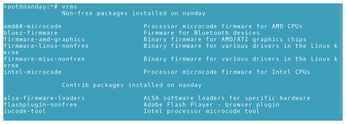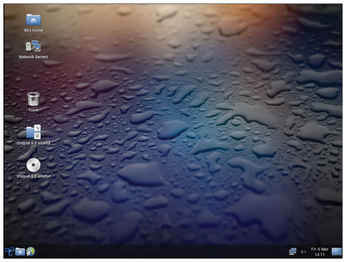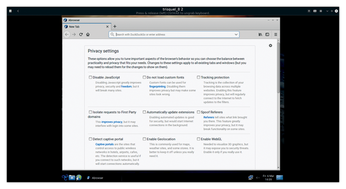Exploring the FSF's free distributions for the desktop
Trisquel
Trisquel (Figure 4) [8] is by far the most active project on FSF's free distribution list. It has been on the list since 2008 and survives on public donations. Based on Ubuntu, Trisquel is available in four versions: the Standard release, which uses MATE as a desktop environment; Trisquel Mini for lighter or older systems, which uses LXDE; Trisquel Sugar Toast for children; and Trisquel Net Install, which installs over the Internet. KDE Plasma and other desktop environments are available in the repositories, and over 51 localizations are available.
Trisquel installs with a minimum of applications – mostly Gnome Technology. Probably the most innovative feature is Abrowser, a modification of Firefox with the name changed for copyright reasons (Figure 5). Abrowser is notable for its numerous security settings, including options to disable JavaScript, geolocation, and the loading of custom fonts. These options are clearly explained, with the fact clearly stated that some of the options may interfere with normal web browsing. However, Abrowser reflects the fact that the browser is generally the most vulnerable part of the operating system.
As a distribution, Trisquel has a long and well-received history. If you wish to run a free system, try a version of Trisquel first.
Roll Your Own
If none of these alternatives suit you, try converting your distro of choice to a free distribution. Before you start, research your hardware, so you know if it requires proprietary blobs. If you wish to run an all-free system, you'll need to replace any hardware that requires non-free drivers.
Next, edit the repositories and their sections so that only those that contain free software are active. In Debian, that means making sure that the Stable, Testing, and Unstable repositories have only the main section enabled and not the contrib and non-free sections. In Ubuntu, disable the Restricted and Multiverse repositories, while in Fedora, check that only the rawhide and fedora repositories are active. Each distribution organizes its repositories differently, but finding which contain proprietary software is usually a matter of seconds. Once only free repositories remain, you will not be able to install proprietary packages without modifying the list of repositories.
Next, you need to remove any proprietary software already installed. Download and re-run deblob, which removes proprietary software [9], and deblob-check, which checks kernels, source code, and patches. Some distributions also have their own tools, like Debian's vrms (virtual Richard M. Stallman), which detects non-free applications [10] (Figure 6). When you want to upgrade a kernel, download one from Linux-libre [11] or its mirrors. Check your distribution for instructions about compiling and installing kernels. Over the years, the procedure has been improved and documented, so that freeing your Linux installation is mostly a matter of patience.
 Figure 6: Debian includes the tongue-in-cheeked named vrms (Virtual Richard M. Stallman), which detects non-free software.
Figure 6: Debian includes the tongue-in-cheeked named vrms (Virtual Richard M. Stallman), which detects non-free software.
At the end of the process, your system will not run any faster, although it might be more secure. But is it worth it? Only you can decide. Still, if software freedom matters to you, then the effort is worthwhile, if only so you can honestly say that your operating system is truly free.
Infos
- The Four Software Freedoms: https://www.gnu.org/philosophy/free-sw.en.html
- Free System Distribution Guidelines: https://www.gnu.org/distros/free-system-distribution-guidelines.html
- FSF list of free distros: https://www.gnu.org/distros/free-distros.html
- Dragora GNU/Linux: https://www.dragora.org/en/index.html
- Dragora video: https://www.youtube.com/watch?v=7lHQ3_HqJcw
- Parabola GNU/Linux: https://www.parabola.nu/
- PureOS: https://www.pureos.net/
- Trisquel: https://trisquel.info/
- Deblobbing scripts: https://www.fsfla.org/svn/fsfla/software/linux-libre/scripts/
- vrms: https://packages.debian.org/jessie/vrms
- Linux-libre: http://www.fsfla.org/ikiwiki/selibre/linux-libre/
« Previous 1 2
Buy this article as PDF
(incl. VAT)
Buy Linux Magazine
Subscribe to our Linux Newsletters
Find Linux and Open Source Jobs
Subscribe to our ADMIN Newsletters
Support Our Work
Linux Magazine content is made possible with support from readers like you. Please consider contributing when you’ve found an article to be beneficial.

News
-
TUXEDO Computers Unveils Linux Laptop Featuring AMD Ryzen CPU
This latest release is the first laptop to include the new CPU from Ryzen and Linux preinstalled.
-
XZ Gets the All-Clear
The back door xz vulnerability has been officially reverted for Fedora 40 and versions 38 and 39 were never affected.
-
Canonical Collaborates with Qualcomm on New Venture
This new joint effort is geared toward bringing Ubuntu and Ubuntu Core to Qualcomm-powered devices.
-
Kodi 21.0 Open-Source Entertainment Hub Released
After a year of development, the award-winning Kodi cross-platform, media center software is now available with many new additions and improvements.
-
Linux Usage Increases in Two Key Areas
If market share is your thing, you'll be happy to know that Linux is on the rise in two areas that, if they keep climbing, could have serious meaning for Linux's future.
-
Vulnerability Discovered in xz Libraries
An urgent alert for Fedora 40 has been posted and users should pay attention.
-
Canonical Bumps LTS Support to 12 years
If you're worried that your Ubuntu LTS release won't be supported long enough to last, Canonical has a surprise for you in the form of 12 years of security coverage.
-
Fedora 40 Beta Released Soon
With the official release of Fedora 40 coming in April, it's almost time to download the beta and see what's new.
-
New Pentesting Distribution to Compete with Kali Linux
SnoopGod is now available for your testing needs
-
Juno Computers Launches Another Linux Laptop
If you're looking for a powerhouse laptop that runs Ubuntu, the Juno Computers Neptune 17 v6 should be on your radar.



